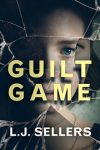

June 12 – 18: “How difficult is it to let go of a character?”
 Just like Madonna’s song “The Power of Goodbye,” how difficult it is to let go of a character? Is it different in a series vs. a stand-alone? This week ITW Members David Salkin, L.J. Sellers, Karen M. McManus, Melodie Winawer, David McCaleb, Dennis Hetzel and A.J. Kerns will discuss letting go.
Just like Madonna’s song “The Power of Goodbye,” how difficult it is to let go of a character? Is it different in a series vs. a stand-alone? This week ITW Members David Salkin, L.J. Sellers, Karen M. McManus, Melodie Winawer, David McCaleb, Dennis Hetzel and A.J. Kerns will discuss letting go.
~~~~~
 David M. Salkin is the author of 13 novels, with Penguin, Post Hill Press and Permuted Press. Salkin’s novels include military-espionage, action-adventure, science-fiction, horror, and crime thrillers.
David M. Salkin is the author of 13 novels, with Penguin, Post Hill Press and Permuted Press. Salkin’s novels include military-espionage, action-adventure, science-fiction, horror, and crime thrillers.
 Melodie Winawer is a physician-scientist and Associate Professor of Neurology at Columbia University. A graduate of Yale University, the University of Pennsylvania, and Columbia University with degrees in biological psychology, medicine, and epidemiology, she has published over fifty nonfiction articles and book chapters. She is fluent in Spanish and French, literate in Latin, and has a passable knowledge of Italian. Dr. Winawer lives with her spouse and their three young children in Brooklyn, New York. The Scribe of Siena is her first novel.
Melodie Winawer is a physician-scientist and Associate Professor of Neurology at Columbia University. A graduate of Yale University, the University of Pennsylvania, and Columbia University with degrees in biological psychology, medicine, and epidemiology, she has published over fifty nonfiction articles and book chapters. She is fluent in Spanish and French, literate in Latin, and has a passable knowledge of Italian. Dr. Winawer lives with her spouse and their three young children in Brooklyn, New York. The Scribe of Siena is her first novel.
 Karen M. McManus earned her BA in English from the College of the Holy Cross and her MA in journalism from Northeastern University. Her debut young adult novel, ONE OF US IS LYING, was released by Delacorte Press/Random House in May 2017, and will be published internationally in 18 territories. To learn more visit www.karenmcmanus.com, or follow @writerkmc on Twitter.
Karen M. McManus earned her BA in English from the College of the Holy Cross and her MA in journalism from Northeastern University. Her debut young adult novel, ONE OF US IS LYING, was released by Delacorte Press/Random House in May 2017, and will be published internationally in 18 territories. To learn more visit www.karenmcmanus.com, or follow @writerkmc on Twitter.
 L.J. Sellers writes the bestselling Detective Jackson mysteries—a four-time winner of the Readers Favorite Awards. She also pens the high-octane Agent Dallas series and provocative standalone thrillers. Her 21 novels have been highly praised by reviewers, and she’s one of the highest-rated crime fiction authors on Amazon. L.J. resides in Eugene, Oregon where many of her novels are set, and she’s an award-winning journalist who earned the Grand Neal. When not plotting murders, she enjoys standup comedy, cycling, and zip-lining. She’s also been known to jump out of airplanes.
L.J. Sellers writes the bestselling Detective Jackson mysteries—a four-time winner of the Readers Favorite Awards. She also pens the high-octane Agent Dallas series and provocative standalone thrillers. Her 21 novels have been highly praised by reviewers, and she’s one of the highest-rated crime fiction authors on Amazon. L.J. resides in Eugene, Oregon where many of her novels are set, and she’s an award-winning journalist who earned the Grand Neal. When not plotting murders, she enjoys standup comedy, cycling, and zip-lining. She’s also been known to jump out of airplanes.
 David McCaleb was born on the Eastern Shore of Virginia. Growing up on a farm, he studied the teachings of nature, enjoying hunting and fishing, intermingled with hard labor. One of the last green belts on the east coast, the Eastern Shore is steeped in creative culture, with which he credits much of his inspiration. In order to counteract the rigidity of having to make a living, David writes. A lot. He started in 2009 and intensely studies his craft. RECALL, the first novel in the RED OPS series, is available August 2016. RELOAD hits shelves August 2017. The third book in the series is currently in production.
David McCaleb was born on the Eastern Shore of Virginia. Growing up on a farm, he studied the teachings of nature, enjoying hunting and fishing, intermingled with hard labor. One of the last green belts on the east coast, the Eastern Shore is steeped in creative culture, with which he credits much of his inspiration. In order to counteract the rigidity of having to make a living, David writes. A lot. He started in 2009 and intensely studies his craft. RECALL, the first novel in the RED OPS series, is available August 2016. RELOAD hits shelves August 2017. The third book in the series is currently in production.
 As a native of Chicago, cheering for the Chicago Cubs, loving baseball and obsessing about politics come naturally to Dennis Hetzel. SEASON OF LIES is his second novel, following the award-winning Killing the Curse (written with Rick Robinson) in which events precede those that unfold in the latest novel. As a journalist and media executive, Dennis has won numerous awards for writing, industry leadership and community service, including the 2003 Paul Tobenkin Memorial Award from the Columbia University Graduate School of Journalism for leadership in coverage of race and diversity issues. Since 2010, he has been president and executive director of the Ohio News Media Association in Columbus, Ohio, and president of the Ohio Coalition for Open Government.
As a native of Chicago, cheering for the Chicago Cubs, loving baseball and obsessing about politics come naturally to Dennis Hetzel. SEASON OF LIES is his second novel, following the award-winning Killing the Curse (written with Rick Robinson) in which events precede those that unfold in the latest novel. As a journalist and media executive, Dennis has won numerous awards for writing, industry leadership and community service, including the 2003 Paul Tobenkin Memorial Award from the Columbia University Graduate School of Journalism for leadership in coverage of race and diversity issues. Since 2010, he has been president and executive director of the Ohio News Media Association in Columbus, Ohio, and president of the Ohio Coalition for Open Government.
 Arthur Kerns is a retired FBI supervisory special agent and past president of the Arizona chapter of the Association of Former Intelligence Officers (AFIO). His award-winning short fiction has appeared in numerous anthologies. He is a book reviewer for the Washington Independent Review of Books. Diversion Books, Inc. NY, NY published his espionage thriller, The Riviera Contract, and the sequel, The African Contract. The third in the series, The Yemen Contract, was released in June 2016.
Arthur Kerns is a retired FBI supervisory special agent and past president of the Arizona chapter of the Association of Former Intelligence Officers (AFIO). His award-winning short fiction has appeared in numerous anthologies. He is a book reviewer for the Washington Independent Review of Books. Diversion Books, Inc. NY, NY published his espionage thriller, The Riviera Contract, and the sequel, The African Contract. The third in the series, The Yemen Contract, was released in June 2016.
- LAST GIRL MISSING with K.L. Murphy - July 25, 2024
- CHILD OF DUST with Yigal Zur - July 25, 2024
- THE RAVENWOOD CONSPIRACY with Michael Siverling - July 19, 2024
